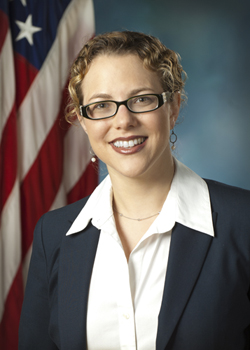
Aviva Sufian
President Barack Obama recently appointed Aviva Sufian as the first Special Envoy for United States Holocaust Survivor Services. Sufian is the director of regional operations in the Administration for Community Living (ACL) in the U.S. Department of Health and Human Services. She previously served in the U.S. Social Security Administration, where she worked on a variety of issues related to both aging and disability, and the New York City Department for the Aging.
While a student at Columbia University in 1995-96, Sufian volunteered with the Shoah Foundation through Columbia's Jewish Student Union. She and other students joined the camera crews and assisted with the videotaping of survivors' testimonies in New York City.
How did your work at the Shoah Foundation affect you - what did it mean to you?
I always knew that preserving survivors’ testimonies was an absolute imperative, but it was through volunteering with the Shoah Foundation that I began to understand the profundity of these efforts. Survivors welcomed us into their homes and places of business, and they granted us the incredible privilege of capturing their most personal experiences on film. There was immeasurable courage contained in those moments, and I developed a deep appreciation for the sanctity of individual sharing and remembrance.
In your opinion, what is your most important job/role as the Holocaust envoy?
To begin, awareness and advocacy are critical. Most people don’t realize how many survivors are living in this country and how many of them are living in poverty. I am proud to serve in an Administration that has made this a priority and is raising the profile of this issue within government and across the private and philanthropic sectors.
This is the last generation of survivors and, as a survivor shared with me, if we don’t help now, we will never be able to. The needs are urgent, and our collective response must be as well.
What are your short- and long-term goals?
My initial focus is on outreach and advocacy. I am conducting an extensive outreach and community engagement process so that I can best understand the unique issues that survivors and their families are facing in the United States. This work will inform the advocacy I am doing to raise the profile of these issues with my colleagues across government.
I will also use what I learn to make recommendations for the implementation of federal programs, such as the new VISTA program that will use AmeriCorps members to build the capacity of nonprofits working with survivors. I will work to support the new Holocaust Survivor Assistance Fund, which President Obama proposed in his budget to Congress for Fiscal Year 2015. If Congress funds this proposal, we aim for this proposed $5 million federal fund to be amplified by additional private dollars and help provide supportive services for survivors living in the United States, such as case management services and assistance with urgent health and social service needs.
Why is it important to support and advocate for Holocaust survivors at their advanced age?
Holocaust survivors are a special population who endured unspeakable horrors at the beginning of their lives. Because of these experiences, survivors are likely to have greater and more complex physical and mental health needs as they age. Further, care provided in institutional settings can raise unique issues for some Holocaust survivors. We want to help this population age with dignity and support in the comfort of their homes and communities.